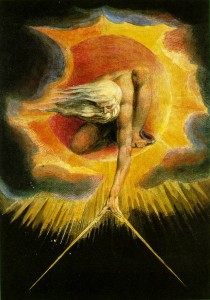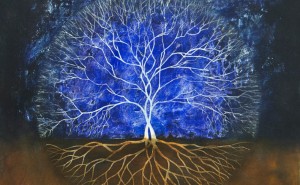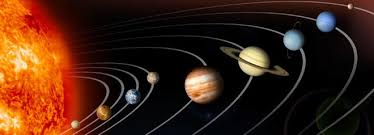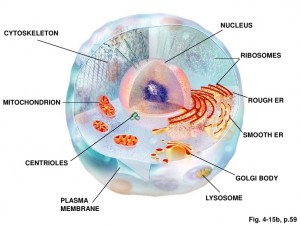1 For all people who were ignorant of God were foolish by nature;
and they were unable from the good things that are seen to know the one who exists,
nor did they recognize the artisan while paying heed to his works;
2 but they supposed that either fire or wind or swift air,
or the circle of the stars, or turbulent water,
or the luminaries of heaven were the gods that rule the world.
3 If through delight in the beauty of these things people assumed them to be gods,
let them know how much better than these is their Lord,
for the author of beauty created them.
4 And if people were amazed at their power and working,
let them perceive from them
how much more powerful is the one who formed them.
5 For from the greatness and beauty of created things
comes a corresponding perception of their Creator. [Wisdom13:1-5, NRSV]
[L] William Blake, Ancient of Days (God Creating the Universe) c. 1794. [M] Snowflake, [R] Image of tree and roots.
Why is Pope Benedict so concerned about our faith being “reasonable”? In the lectures and now in his book, Benedict speaks to Europeans who are “civilized” people, of whom Dostoevsky once asked an arresting question: “Can one believe while being civilized, i.e. a European?, believe without reservation in the divine nature of Jesus Christ, the Son of God?” In this modern technocratic age, Pope Benedict knows all too well that faith must be reasonable or it is insulting to expect people to believe it. He will repeatedly argue from different angles the reasonableness of a faith in creation and the Creator. Above all, he wants to show the Creator as the eternal Cosmic Intelligence, the eternal Source of life in the universe, the eternal Good and Benign Power that stands at the very origin of our creation and sustenance.
How does Pope Benedict address the question of reason and intelligibility?
Once the readers see the fundamental intention of showing God as Creator of the world, they can follow the narrative sequence and see that things did not come about randomly or by accident. Rather, all things originated in God’s eternal Reason. And all things came into being because of God’s will, through the power of his Word. This is immensely important, for once we realize that the world came from the Word of God – He who is good and all-powerful:
- We can cease to be irrationally enslaved by the gods and demons;
- We can be soberly optimistic in using all things [visible and invisible] to serve rather than master us in our service of God;
- We are freed to lift up our reason in honour of God and even approach God fearlessly.
So in this Word, we encounter true enlightenment, able to submit ourselves to the real primordial force, the power that is above all powers, and enjoy freedom – a freedom from irrational fear; a freedom that is born of rational acceptance of the Creator God and rational trust in Him for our future.
- A story for Christian living: Fr. Vincent handling bomoh charms. Some twenty-five years ago, while he was serving as a young priest at the Cathedral Parish, Kuching, Fr. Vincent received a desperate request for help. At the other side of Kuching city, where the locals call “across the river”, the Muslim-led sate government had a number of building projects on foot, including a state-mosque, a centre for Islamic affairs, a college for Islamic studies and so on. At one of those projects, no sooner had the Chinese contractors been given the green lights to commence work, than the whole schedule came to a complete halt. The reason was simple: as the workers started to clear the ground, they came across a number of bomoh charms which nobody dared to touch. Upon requests, the Islamic religious authorities refused to get involved, even though the project was theirs. In desperation, the Chinese contractors came to a priest in the Catholic Church for help. Eventually, the matter came to Fr. Vincent, who was persuaded to help. Armed with holy water and the power of prayer, Fr. Vincent did his thing. He picked up the charms and burnt them all in the incinerator and that was that! Asked whether he was not afraid as the Muslim religious authorities allegedly were, his reply comprised the kind of stuff Christians would do well to remember. He said, “We shouldn’t play the fool with demons and evil spirits. Keep your distance from them. At the same time, as people of faith, we shouldn’t be so fearful of tem as to lose our trust in the Lord. Yes, demons and evil spirits are real and they do exist. But, we believe in Jesus Christ. He is the highest authority. In Him we trust. We call on His name for protection. We shall not fear unnecessarily.” Somehow, that sounded so rational, so intelligible, so reassuring.
The reasonableness of faith in creation
Pope Benedict wants to deepen our grasp on “reasonableness” in two directions:
[a] Concerning the space and time of creation [spatio-temporality]
In the 19th century, scientific theories on the conservation of matter and of energy did away with the need for God. Matter and energy could not be created or destroyed in a closed system; no external influence was needed; total energy stayed constant despite internal changes.
The universe was seen as ever-existing, governed by unchanging laws of nature, and depending on itself alone, thus needing nothing outside of itself. God as a hypothesis became quite unnecessary.
Then, new discoveries broke across the horizon of knowledge. The theory of entropy, for instance, spoke of a principle of thermodynamics dealing with energy and refers to the idea that everything in the universe eventually moves from order to disorder, and witnessed to a measure of the unavailable energy in a closed thermodynamic system. This generated appreciation of a universe that is subject to both becoming and destruction. Added to this was the comprehension of the convertibility of matter into energy and the theory of relativity. All this points to a universe that is temporal, that postulates a beginning and an end, and that speaks of the passage or trajectory from a beginning to an end.
In this awareness of the temporality of being, it becomes possible to discern an “in the beginning” moment that the Bible refers to.
[b] Concerning the design of the universe
Pope Benedict works towards an interrelatedness in science and theology.
Far from creating the universe in a haphazard fashion, our growing scientific knowledge of the universe increasingly points to an astonishing Reason and we become awestruck as we contemplate and see anew that Creating Intelligence from whom we derive our own reason.
We realize that the “Let there be…” commands of God were not some haphazard commands; rather, they issued out of the primordial Intelligence based on a model of construction. In the light of the grand design of creation, Albert Einstein said that compared to that superior Reason, all our so-called significant thoughts and designs are mere empty reflections. And in light of the smallest details – cells and primordial units of life – we can say with St. Bonaventure that whoever does not see and praise the creating Intelligence is simply dumb.
Solar system planets Structures of a human cell
And so, against authors like Jacques Monod who insist upon a theory that says nature has arisen out of errors and dissonance, that the world originated out of an interplay of chance and necessity, and thus reject as unscientific every kind of faith in God, we can state rationally that what they are asking us to believe is far more unbelievable than what we have in the Christian creed.
Their hermeneutic lens is pathetically inadequate when those scientists insist that a question be discounted out of hand (a priori) when the answer would have to be God. Instead, physics, biology and the natural sciences have contributed to our greater understanding of creation with great new discoveries. They offer us a vast amount of new images that help us recognize and appreciate better the depth of the deeper reality of creation and the creating Intelligence.
We note here that there are different kinds of scientists. Some are of the same mold as Monod who would dismiss all things religious out of hand. But there are many other scientists, whether they are Christians or not, who maintain an open mind. These latter scientists would be delighted to read from a top-ranking world religious leader in the person of Pope Benedict who gives due credit to scientific discoveries and who fruitfully integrates them into a theological reflection on creation and the origin of the universe.
That said, Pope Benedict nevertheless warns of two dangers.
Danger 1: Obstacle from science and technology. But, technological civilization cuts us off from this primordial knowledge. Increasing scientific know-how prevents us from knowing the fact of creation.
Danger 2: Obstacles from misunderstanding what worship is about. The idea of worship may get misinterpreted to mean: that in worship the human beings give something to the gods that they themselves stand in need of; that the divinity demands this attention; and that this worship has for its purpose the preservation of the world.
These dangers hint of the possibility for manipulation and abusive control.
Bible declares that creation leads to Sabbath. But the Sabbath sums up the Torah, the law of Israel. “This means that worship has a moral aspect to it. God’s whole moral order has been taken up into it; only thus is it truly worship.” In sum, God created the universe in order to enter into a history of love with humankind. He created it so that love could exist.
Copyright © Dr. Jeffrey & Angie Goh, September 2017. All rights reserved.
You are most welcome to respond to this post. Email your comments to jeffangiegoh@gmail.com. You can also be dialogue partners in this Ephphatha Coffee-Corner Ministry by sending us questions for discussion.





